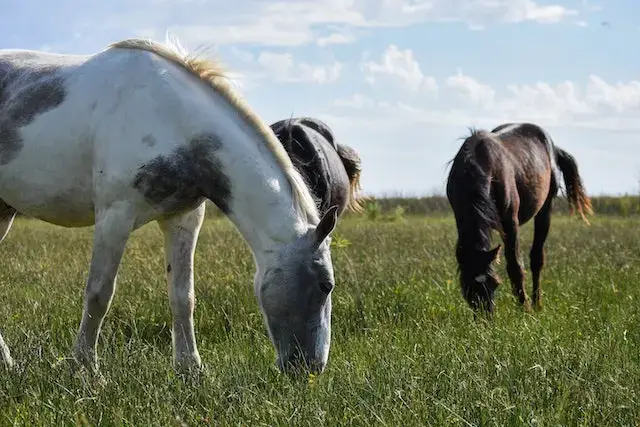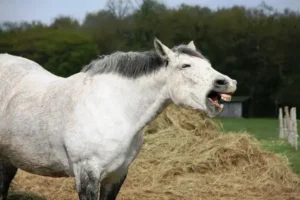Horses: majestic, powerful, and elegant creatures that have fascinated humans for centuries. We admire their grace and beauty, but there’s an often-overlooked aspect of their lives that tends to elicit giggles and curiosity – flatulence.
That’s right, we’re talking about horse farts! It may seem like an odd topic to discuss, but understanding equine flatulence can actually provide valuable insights into a horse’s health and digestive system.
So, hold your nose and read on to find out ‘Do horses fart?’
Do Horses Fart – When and Why?

Now and again, the internet blows up with videos of horses farting loudly, getting scared of their own farts, causing children to cry out loud, etc. While such videos are hilarious, they prove that horses produce vast amounts of gases through their normal digestive process.
But, do horses fart often? Horses produce a unique blend of gasses while breaking down the high quantity of roughage commonly found in their diet. So farting and displaying physical signs of flatulence are both familiar and natural for these animals.
On the other hand, remember that horses are very agile and active creatures. They maintain a stable set of bodily functions. Therefore, a sudden increase in farting or the presence of a bloated stomach can be a valid cause for concern.
Horse farts can be noisy and very smelly. In fact, as an animal owner, you might notice that horses fart more often than other animals! Horse farts contain a unique blend of different gases, the most harmful of them being methane.
Why Do Horses Fart More Often?
Horses can suddenly start farting more than usual. Some common reasons are these:
- Sudden change in diet: have you made any recent changes in your horse’s diet? Such a change can lead to a need for digestive adjustments which typically take time. So, flatulence from dietary changes can be both temporary and permanent.
- Aging: Like most other animals, horses start experiencing digestive difficulties as they age. Excessive methane production is an extremely common reason for increased farting in advanced age.
- Excessive Gas Colic: Colic is a serious issue among horses and can affect a horse of any age. In this case, it is best to get your horse checked by a professional health professional as soon as possible.
- Mental disturbance: A horse affected with mental distress like stress, depression, chronic pain, fatigue, etc will not be able to digest food properly and suffer from a gassy stomach.
Must Read: Do Horses Have Periods?
Do Horses Fart To Maintain Digestive Health?
A fart is a natural way to maintain metabolism, digestion, and body balance in most animals. And this is no different in horses! A horse that farts a lot can also be very healthy, some of the best breeds of horses are naturally more gassy!
Horses can start to fart when they run, gallop, or buck. After all, exercise can suddenly change the rate of gut motility. Therefore, a change in exercise routine can also prompt more farting in horses.
Moreover, the release of stomach gas is a sign of healthy digestion as opposed to internal gas buildup. Many experts have also stated that farting can reduce the chances of your horse getting colitis. On some days, your horse can simply fart more because they have eaten a lot.
However, the release of gas in enclosed places can be harmful to the horse itself as well as other animals in the immediate surrounding. Congestion of methane gas in stables can cause a rise in surrounding temperature, affect the lungs and reduce the coat quality.
Good Diet And A Healthy Equine Stomach
Horses will always fart. A good diet will facilitate farting and facilitate the consumption of more food and energy. A healthy horse stomach shows a high motility rate, a ready appetite, and the common phenomenon of ‘hey belly’.
Your pet horse will benefit a lot from good quality fodder. Additionally, it will need high fiber forage that it can graze on whenever it wants to.
A change in hay or forage source can disrupt the stomach – such changes should only be few in a horse’s life – and even then, they should be introduced gradually.
The Case Of Gas Colic
When gas cannot pass through the long, equine intestine and keep getting accumulated in one or more pockets, it can cause the intestine to inflate and give rise to abdominal pain. Over the next few months, pain can lead to wounds, and wounds can lead to ulcers.
In many cases, gas colic can go away on its own. Persistent pain, however, can be a sign that something fundamental in the feeding or exercise regime of the animal is wrong.
Interestingly, horses are not capable of burping or belching. They typically also don’t curl or stretch the stomach region. Hence, horses depend only on farting to experience a healthy release.
Common Causes of Gas Colic in Horses
There are indeed several reasons behind Gas Colic. Some common ones to look out for include:
- Dehydration
- Unsuitable diet for the particular
- Breed
- Inadequate forage or too many changes in forage quality
- Ulcer
- Stress
- Too much or too little exercise
- Aging
- Confinement, lack of natural environment
- Hormonal imbalance
- A diet of easily fermentable grass species
Some signs we would be worried about are behavioral changes, loss of appetite, unusual stool consistency, lack of sleep, etc.
Depression, belly biting, repeated rolling, etc are some additional signs of gas buildup. Too much sweating and an increase in heart rate or respiratory rate can also point to abdominal pain.
Rather than measuring the intensity of farting, we encourage readers to look into any sudden change in the rate of farting as those can be a bigger reveal of something more being wrong.
Final Thoughts
A healthy digestive system is foundational to the wellness and performance of all animals. Horses fart as a natural way to sustain their metabolism.
But do horses also fart to relieve themselves of some deadly disease? Yes! The intensity, consistency, and nature of horse farts can be one of the earliest indications that something is amiss.
Visiting a vet on time and implementing prompt changes in your horse’s lifestyle can do wonders in preventing something big.
Frequently Asked Question
Q1. Do horses fart methane?
Ans: Yes, horses do fart methane. Each horse is capable of producing 45.5 pounds of methane gas annually, but the amounts vary greatly.
Q2. What causes horses to fart?
Ans: The digestive process of horses makes them fart because their large intestine breaks down food and produces gases, including methane.
Q3. What is the gassiest animal?
Ans: The gassiest animal on Earth is the termite. Termites produce more methane than any other animal. This is because termites rely on microbes in their gut to break down wood and other plant materials, which produces methane as a byproduct.



